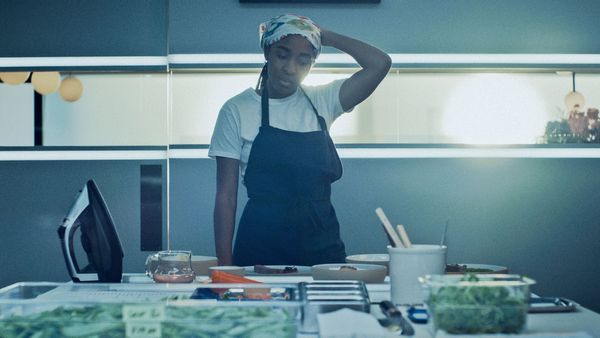
Any show endeavoring to depict a restaurant as something more singular than a mere assembly of odd characters shows employees sitting down to share a meal before service. This is called family meal, a practical tradition that bonds and nourishes the crew before they head into the fray that is feeding the public.
That duty brings its own pressure, as we know from watching Jeremy Allen White’s Carmy Berzatto struggle endlessly to keep his inner turmoil from breaking loose on “The Bear.”
This happens at inopportune moments, most of them entirely preventable. In that process, if Carmy had slowed down to listen to his partner Sydney (Ayo Edebiri) and others, he wouldn’t have gotten locked inside the kitchen’s walk-in during his bistro’s soft opening. But Carmy’s purposefully cultivated family steps in to steer the night through disaster, delivering a triumphant first night and second season closing.
Season 3 picks up the morning after with Carmy alone again, and entirely inside his head, hypnotically capturing us within the pull between Carmy’s afflictive past and the empty yearning of his present.
Its soundtrack is variations on a theme, a round that doesn’t fundamentally change but adds and subtracts bass notes, and a hazy electronic chorus sighing an ode to desires beyond reach. Later in the season when he describes a buzz in his brain, we know it sounds seductive and a little painful.
Every season “The Bear” forces family to take on meaning and portent beyond whatever is on the menu, which is series creator Christopher Storer’s way of inviting us to intimately sense, marinate and feel the story.
Easy enough. For us, the strangers bringing our expectations through a restaurant's door, what happens in kitchens is a mystery. All we experience is the result of a chef's magic, ranging from the commonplace, like the beans your favorite neighborhood pub seasons just so, to the once-in-a-lifetime sorcery expected by those dining at Michelin-starred establishments.
The opening episode illustrates the new season’s ambitions by traveling through Carmy’s memories as he quietly neatens a place that is mostly cleaned up. He’s all heart, and heartbroken, having driven away the woman he loves, Claire (Molly Gordon), by blurting out words he didn’t mean but are entirely honest.
Carmy’s serious front masks a juxtaposition between peacefulness and noise, order and chaos, simple unmitigated love and burning, biting and scarring obsession. That’s in him, and in all of us. It heats this kitchen.
Carmy’s yen for order and structure grows pathological when he scrawls a list of "non-negotiable"s that makes Syd and cousin Richie (Ebon Moss-Bachrach) recoil. They’ve already proven their capabilities; now, here comes the guy whose brain exploded talking about “vibrant collaboration” and “no excuses.”

Thanks to Carmy’s insistence on using the best ingredients, the newly launched ship is taking on water to the distress of Nat (Abby Elliott) and Unc (Oliver Platt). But Carmy won’t listen. He isn’t hearing much of anything over the self-loathing and doubt blasting in his brain.
For everything and everyone in “The Bear,” success is life and death, hinging on the understanding that it’s all the same thing. Opposites make the whole.
Great shows move the audience to consider art’s power naturally, without forcing it into the plot. The third season arc explores the folly and magic inherent to inspiration and process, as I mentioned, but also dreams, hauntings, and legacy.
And, hunger. Always hunger.
Perhaps because the public nurtures a horniness for White’s tousled-haired chef and a fervor for Edebiri’s empathetic yet tough-minded Syd constantly reminding us that dealing with such geniuses can be equally fulfilling and draining, the show’s glamor hasn’t worn off yet.
There are only so many times and ways a critic can hail a show for continuing to top itself. To say “The Bear” does not do that in its third season isn’t an indicator of failure, though, but a proposal that we realign our thinking about it to consider the newest episodes as part of a successful continuum.

But Storer, who either writes or co-writes seven out of the season’s 10 episodes, integrates comedic grace notes into every episode. The cameos are spot-on. One in the fifth episode straight up made me smile and laugh out loud.
Concurrent with those lighter moments are passages in just about every new episode that made me well up, especially those that emphasize art’s value and the ways it enhances the human experience.
The writing and acting are flavors working in concert together in a way that argues in favor of binging it.
In any other show, we’d call that pairing character development. Here it takes on other considerations. Carmy is a mood colored by fury and more of that hunger. His main drive to open a restaurant, at least at first, was to honor his late brother Michael (recurring guest star Jon Bernthal). But his obligation to Syd and Michaels’ old crew at the Beef, including the staff's pastry chef Marcus (Lionel Boyce), sous-chef Tina (Liza Colón-Zayas), and his sister Nat, aka Sugar, forces him to set harder-to-hit target.
Perfecting recipes is an ongoing quest for balance, demanding constant fine-tuning. “The Bear” makes this real by weighing heightened stress with boisterous humor and palate-cleansing silence. The A-plot still revolves around Carmy, but as the show has gone on the writers have evolved what that focus means while increasing the screentime and focus on the rest of the ensemble.
Ultimately that realignment of what everyone else means to Carmy ensures White’s stress-blinking chef still seizes the show’s focus, stacking the actor’s award show reels with blood-pressure elevating emotion.
Now “The Bear” asks us to consider how our compulsion to enable people like Carmy enforces the myth that genius requires accommodating terrible behavior. If this leg of the Berzatto Chef’s Tour shows that the torturous quest for precision might uncover brilliance, arrogance, and pain, it also reminds us that others, like Syd, have a right to shine too.
Along with that are its usual close contemplations of what family means – none of which pushed our face into the stew as forcefully as last season’s “Fishes,” I’ll grant you. But along with marking time through the pregnant Nat’s due date drawing nearer, these new chapters examine that through an episode devoted to Liza Colón-Zayas’ Tina, the personification of the place’s grit.
We don’t follow her on a fantasy excursion, which lets us know what a luxury that Copenhagen trip was for Boyce’s Lionel, but through the harsh realities of what it means to be a middle-aged Latina in the job market that, like the rest of the world, is youth obsessed.
Working with Michael and later, Carmy, allows her to see more possibilities for herself, which is its own luxury. But that's also why Syd still desires a Michelin star, and the training she and Carmy invest in Tina, Marcus and the rest makes them want it too. Marcus, reeling from a massive loss, decides if he’s going to give his life to this dream it needs to work.
“Take us there, Bear,” he tells Carmy with an intensity Boyce infuses with a determination and grief that sauces this show, making it that much easier to devour. We may regret taking in all 10 episodes at once; we always do. Never because it leaves a bad taste, but because the proportion of bitter to sweet is just right.
All episodes of "The Bear" are streaming on Hulu.







